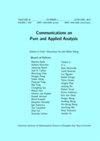带挫折的离散时间Kuramoto模型的同步问题
IF 0.9
3区 数学
Q1 MATHEMATICS
引用次数: 0
摘要
本文研究了带挫折的Kuramoto模型的紧急离散动力学问题。对于具有挫折的离散相同Kuramoto模型,给出了限制在半圆内的若干可容许的初始构型类的指数同步估计。对于非同振子,利用原Kuramoto模型的二阶提升,研究了相应离散增广模型的涌现行为。更确切地说,在耦合强度大、步长小的充分框架下,我们推导出分布在四分之一圆小集合中的初始构型收敛于频率同步。本文章由计算机程序翻译,如有差异,请以英文原文为准。
On the synchronization of discrete-time Kuramoto model with frustration
In this paper, we study the emergent discrete-time dynamics of the Kuramoto model with frustration. For the discrete identical Kuramoto model with frustration, we present the exponential synchronization estimate for some admissible classes of initial configuration confined in a half circle. For the nonidentical oscillators, we exploit the second-order lifting of the original Kuramoto model with frustration and study the emergent behaviors of the corresponding discrete augmented model. More precisely, under a sufficient framework in terms of large coupling strength and small step size, we derive that the initial configuration distributed in a small set of a quarter circle will converge to frequency synchronization.
求助全文
通过发布文献求助,成功后即可免费获取论文全文。
去求助
来源期刊
CiteScore
1.90
自引率
10.00%
发文量
124
审稿时长
4-8 weeks
期刊介绍:
CPAA publishes original research papers of the highest quality in all the major areas of analysis and its applications, with a central theme on theoretical and numeric differential equations. Invited expository articles are also published from time to time. It is edited by a group of energetic leaders to guarantee the journal''s highest standard and closest link to the scientific communities.

 求助内容:
求助内容: 应助结果提醒方式:
应助结果提醒方式:


